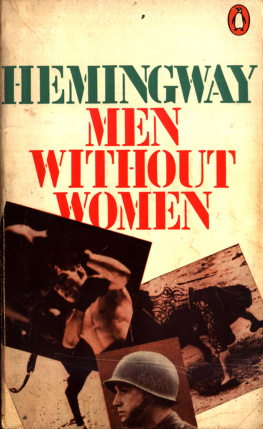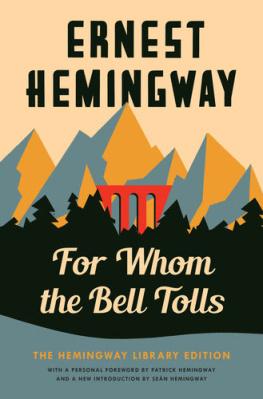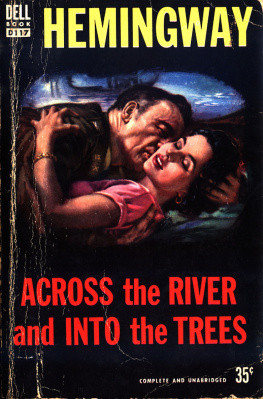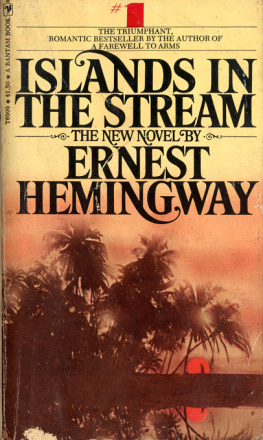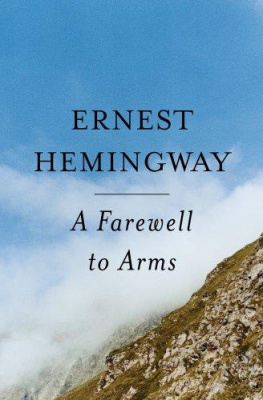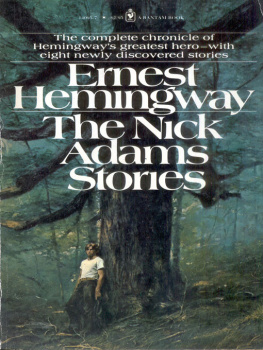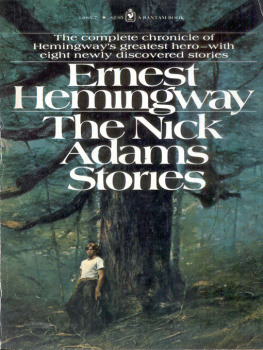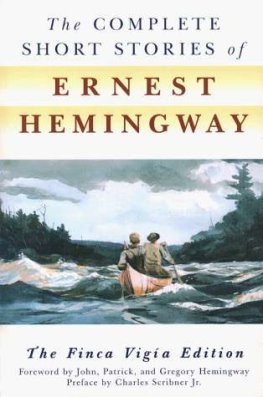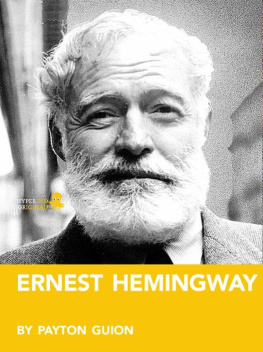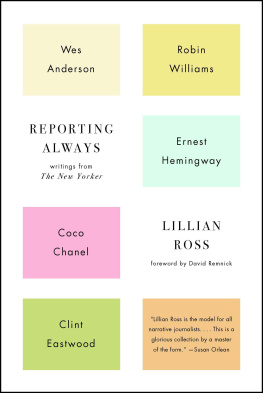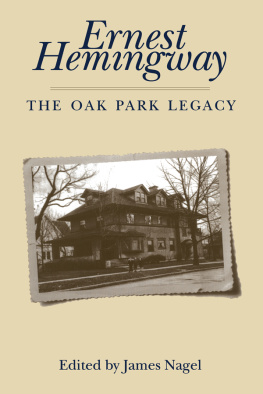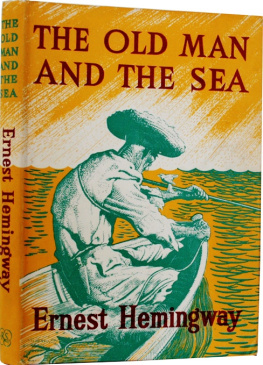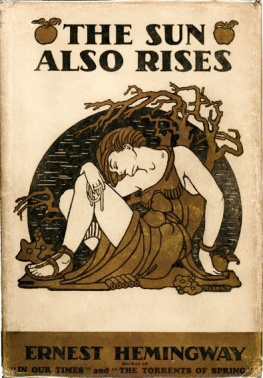Ernest Hemingway - Men Without Women
Here you can read online Ernest Hemingway - Men Without Women full text of the book (entire story) in english for free. Download pdf and epub, get meaning, cover and reviews about this ebook. year: 1969, publisher: Penguin Books, genre: Detective and thriller. Description of the work, (preface) as well as reviews are available. Best literature library LitArk.com created for fans of good reading and offers a wide selection of genres:
Romance novel
Science fiction
Adventure
Detective
Science
History
Home and family
Prose
Art
Politics
Computer
Non-fiction
Religion
Business
Children
Humor
Choose a favorite category and find really read worthwhile books. Enjoy immersion in the world of imagination, feel the emotions of the characters or learn something new for yourself, make an fascinating discovery.
- Book:Men Without Women
- Author:
- Publisher:Penguin Books
- Genre:
- Year:1969
- Rating:3 / 5
- Favourites:Add to favourites
- Your mark:
- 60
- 1
- 2
- 3
- 4
- 5
Men Without Women: summary, description and annotation
We offer to read an annotation, description, summary or preface (depends on what the author of the book "Men Without Women" wrote himself). If you haven't found the necessary information about the book — write in the comments, we will try to find it.
Men Without Women — read online for free the complete book (whole text) full work
Below is the text of the book, divided by pages. System saving the place of the last page read, allows you to conveniently read the book "Men Without Women" online for free, without having to search again every time where you left off. Put a bookmark, and you can go to the page where you finished reading at any time.
Font size:
Interval:
Bookmark:
PENGUIN BOOKS
MEN WITHOUT WOMEN
Ernest Miller Hemingway was born in 1899 at Oak Park, a highly respectable suburb of Chicago, where his father, a keen sportsman, was a doctor. He was the second of six children. The family spent holidays in a lakeside hunting lodge in Michigan, near Indian settlements. Although energetic and successful in all school activities, Ernest twice ran away from home before joining the Kansas City Star as a cub reporter in 1917. Next year he volunteered as an ambulance driver on the Italian front and was badly wounded. Returning to America he began to write features for the Toronto Star Weekly in 1919 and was married in 1921. That year he came to Europe as a roving correspondent and covered several large conferences. In France he came into contact with Gertrude Steinlater they quarreledEzra Pound, and James Joyce. He covered the Greco-Turkish war in 1922. Three Stories and Two Poems was given a limited publication in Paris in 1923. Thereafter he gradually took to a life of bull-fighting, big-game hunting, and deep-sea fishing. He visited Spain during the Civil War. Latterly he lived mostly in Cuba, and he died in July 1961.
He early established himself as the master of a new, tough, and peculiarly American style of writing and became a legend during his lifetime. But, as John Wain wrote in the Observer after his death, Though there were many imitators there was never truly a School of Hemingway, because the standard he set was too severe.
His best-known books were A Farewell to Arms (1929), Death in the Afternoon (1932), For Whom the Bell Tolls (1940), and The Old Man and the Sea (1952). In 1954 he was awarded the Nobel Prize for Literature. Ernest Hemingway had three sons.
MEN
WITHOUT WOMEN
ERNEST HEMINGWAY
PENGUIN BOOKS
Penguin Books Ltd, Harmondsworth , Middlesex, England
Penguin Books Australia Ltd, Ringwood, Victoria, Australia
First published by Jonathan Cape 1928
Published in Penguin Books 1955
Reprinted 1956, 1957, 1958, 1960, 1962, 1963, 1965, 1967, 1969, 1971, 1972
Made and printed in Great Britain
by Hunt Barnard Printing Ltd, Aylesbury
Set in Monotype Bembo
This book is sold subject to the condition
that it shall not, by way of trade or otherwise,
be lent, re-sold, hired out, or otherwise. Circulated
without the publishers prior consent at any form of
binding or cover other than that in which it is
published and without a similar condition
including this condition being imposed
on the subsequent purchaser
To
EVAN SHIPMAN
MANUEL GARCIA climbed the stairs to Don Miguel Retanas office. He set down his suitcase and knocked on the door. There was no answer. Manuel, standing in the hallway, felt there was someone in the room. He felt it through the door.
Retana, he said, listening.
There was no answer.
Hes there, all right, Manuel thought.
Retana, he said and banged the door.
Whos there? said someone in the office.
Me, Manolo, Manuel said.
What do you want? asked the voice.
I want to work, Manuel said.
Something in the door clicked several times and it swung open. Manuel went in, carrying his suitcase.
A little man sat behind a desk at the far side of the room. Over his head was a bulls head, stuffed by a Madrid taxidermist; on the walls were framed photographs and bullfight posters.
The little man sat looking at Manuel.
I thought theyd killed you, he said.
Manuel knocked with his knuckles on the desk. The little man sat looking at him across the desk.
How many corridas you had this year? Retana asked.
One, he answered.
Just that one? the little man asked.
Thats all.
I read about it in the papers, Retana said. He leaned back in the chair and looked at Manuel.
Manuel looked up at the stuffed bull. He had seen it often before. He felt a certain family interest in it. It had killed his brother, the promising one, about nine years ago. Manuel remembered the day. There was a brass plate on the oak shield the bulls head was mounted on. Manuel could not read it, but he imagined it was in memory of his brother. Well, he had been a good kid.
The plate said: The Bull Mariposa of the Duke of Veragua, which accepted 9 varas for 7 caballos, and caused the death of Antonio Garcia, Novillero, April 27, 1909.
Retana saw him looking at the stuffed bulls head.
The lot the Duke sent me for Sunday will make a scandal, he said. Theyre all bad in the legs. What do they say about them at the Caf?
I dont know, Manuel said. I just got in.
Yes, Retana said. You still have your bag.
He looked at Manuel, leaning back behind the big desk.
Sit down, he said. Take off your cap.
Manuel sat down; his cap off, his face was changed. He looked pale, and his coleta pinned forward on his head, so that it would not show under the cap, gave him a strange look.
You dont look well, Retana said.
I just got out of the hospital, Manuel said.
I heard theyd cut your leg off, Retana said.
No, said Manuel. It got all right.
Retana leaned forward across the desk and pushed a wooden box of cigarettes toward Manuel.
Have a cigarette, he said.
Thanks.
Manuel lit it.
Smoke? he said, offering the match to Retana.
No, Retana waved his hand. I never smoke.
Retana watched him smoking.
Why dont you get a job and go to work? he said.
I dont want to work, Manuel said. I am a bullfighter.
There arent any bullfighters any more, Retana said.
Im a bullfighter, Manuel said.
Yes, while youre in there, Retana said.
Manuel laughed.
Retana sat, saying nothing and looking at Manuel.
Ill put you in a nocturnal if you want, Retana offered.
When? Manuel asked.
Tomorrow night.
I dont like to substitute for anybody, Manuel said. That was the way they all got killed. That was the way Salvador got killed. He tapped with his knuckles on the table.
Its all Ive got, Retana said.
Why dont you put me on next week? Manuel suggested.
You wouldnt draw, Retana said. All they want is Litri and Rubito and La Torre. Those kids are good.
Theyd come to see me get it, Manuel said, hopefully.
No, they wouldnt. They dont know who you are any more.
Ive got a lot of stuff, Manuel said.
Im offering to put you on tomorrow night, Retana said. You can work with young Hernandez and kill two novillos after the Charlots.
Whose novillos? Manuel asked.
I dont know. Whatever stuff theyve got in the corrals. What the veterinaries wont pass in the daytime.
I dont like to substitute, Manuel said.
You can take it or leave it, Retana said. He leaned forward over the papers. He was no longer interested. The appeal that Manuel had made to him for a moment when he thought of the old days was gone. He would like to get him to substitute for Larita because he could get him cheaply. He could get others cheaply too. He would like to help him though. Still, he had given him the chance. It was up to him.
How much do I get? Manuel asked. He was still playing with the idea of refusing. But he knew he could not refuse.
Two hundred and fifty pesetas, Retana said. He had thought of five hundred, but when he opened his mouth it said two hundred and fifty.
You pay Villalta seven thousand, Manuel said.
Youre not Villalta, Retana said.
I know it, Manuel said.
He draws it, Manolo, Retana said in explanation.
Sure, said Manuel. He stood up. Give me three hundred, Retana.
All right, Retana agreed. He reached in the drawer for a paper.
Can I have fifty now? Manuel asked.
Next pageFont size:
Interval:
Bookmark:
Similar books «Men Without Women»
Look at similar books to Men Without Women. We have selected literature similar in name and meaning in the hope of providing readers with more options to find new, interesting, not yet read works.
Discussion, reviews of the book Men Without Women and just readers' own opinions. Leave your comments, write what you think about the work, its meaning or the main characters. Specify what exactly you liked and what you didn't like, and why you think so.

